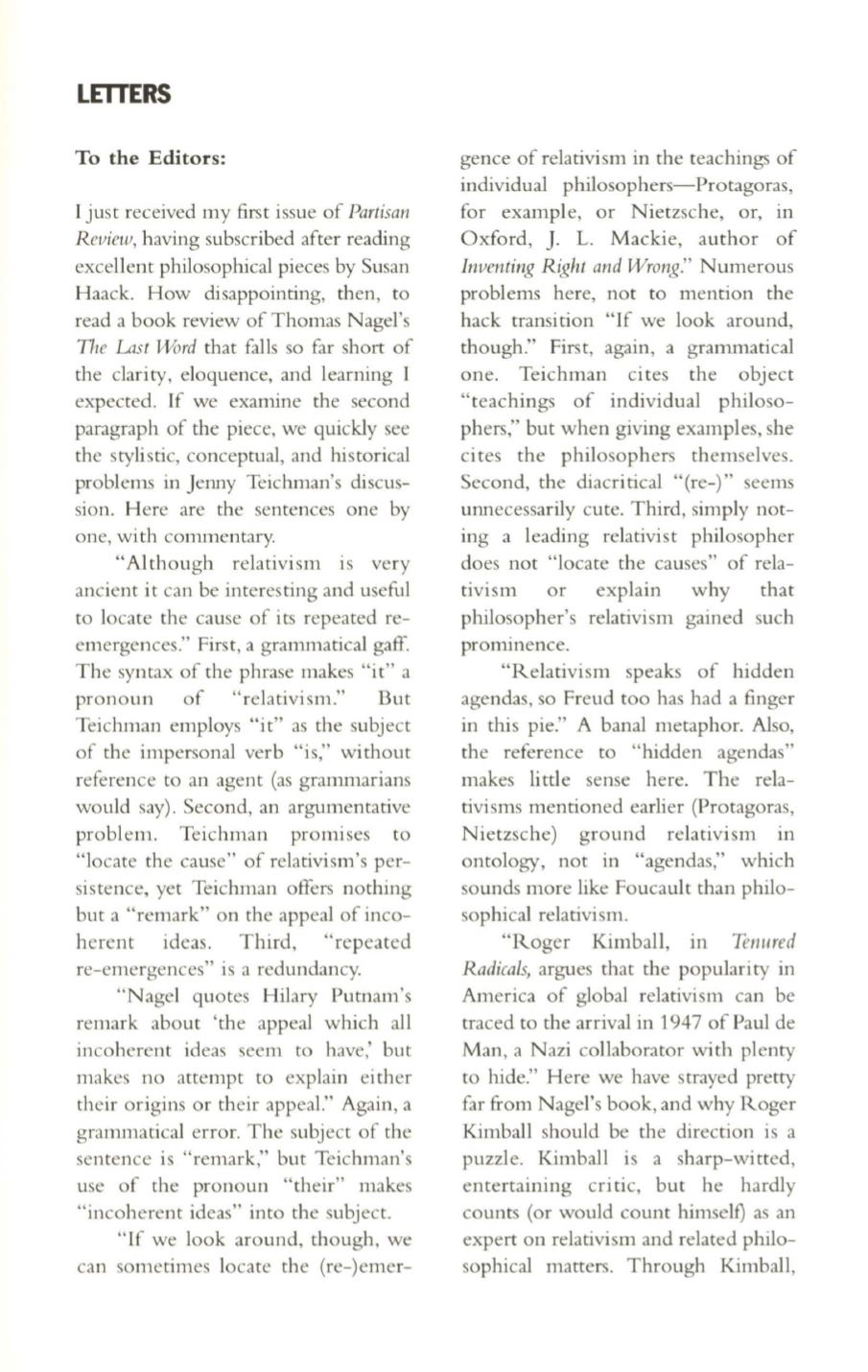
LmERS
To the Editors:
I just received my first issue of
Partisan
Review,
having subscribed after reading
excellent philosophical pieces by Susan
Haack. How disappointing, then, to
read a book review of Thomas Nagel's
TIle
Last Word
that falls so far short of
the clarity, eloquence, and learning I
expected. If we examine the second
paragraph of the piece, we quickly see
the stylistic, conceptual, and historical
problems in Jenny Teichman's discus–
sion. Here are the sentences one by
one, with COn1l11entary.
"Although relativism is very
ancient it can be interesting and useful
to locate the cause of its repeated re–
emergences." First, a gran1l11atical gaff.
The syntax of the phrase makes "i t" a
pronoun of "relativism."
But
Teichman employs "it" as the subject
of the impersonal verb "is," without
reference to an agent (as graI11l11arians
would say). Second, an argumentative
problem. Teichman promises to
"locate the cause" of relativism's per–
sistence, yet Teichman offers nothing
but a "remark" on the appeal of inco–
herent ideas. Third, "repeated
re-emergences" is a redundancy.
"Nagel quotes Hilary Putnam's
remark about 'the appeal which all
incoherent ideas seem to have: but
makes no attempt to explain ei ther
their origins or their appeal." Again, a
grammatical error. The subject of the
sentence is "renurk," but Teichn1an's
use of the pronoun "their" makes
"incoherent ideas" into the subject.
"If we look around, though, we
can sometimes locate the (re-)emer-
gence of relativism in the teachings of
individual philosophers-Protagoras,
for example, or Nietzsche, or, in
Oxford,
J.
L.
Mackie, author of
Inventing Right and Wrong."
Numerous
problems here, not to mention the
hack transition "If we look around,
though." Firs t, again, a graI11l11atical
one. Teichman ci tes the object
"teachings of individual philoso–
phers," but when giving examples, she
ci tes the philosophers themselves.
Second, the diacri tical "(re-),' seems
unnecessarily cute. Third, simply not–
ing a leading relativist philosopher
does not "locate the causes" of rela–
tivism
or explain
why that
philosopher's relativism gained such
prominence.
"Relativism speaks of hidden
agendas, so Freud too has had a finger
in this pie." A banal metaphor. Also,
the reference to "hidden agendas"
makes little sense here. The rela–
tivi sms mentioned earlier (Protagoras,
Nietzsche) ground relativism
111
ontology, not in "agendas," which
sounds more like Foucault than philo–
sophical relativism.
"Roger Kimball,
111
Tenured
RadicaLs,
argues that the popularity in
America of global relativism can be
traced to the arrival in
1947
of Paul de
Man, a Nazi collaborator with plenty
to hide." Here we have strayed pretty
far from Nagel's book, and why Roger
Kimball should be the direction is a
puzzle. Kimball is a sharp-wi tted,
entertaining cri tic, but he hardly
counts (or would count himself) as an
expert on relativism and related philo–
sophical matters. Through Kimball,


